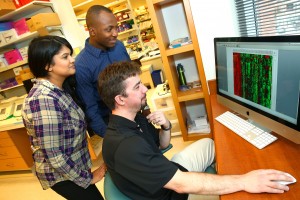Hara Levy laboratory
Northwestern University Feinberg School of Medicine
Integrating Genetics and Genomics
The Levy lab focuses on integrating genetic and genomic analyses to advance our understanding of how environmental, genetic, and epigenetic factors influence the progression of cystic fibrosis (CF). Although CF is a monogenic autosomal recessive disorder caused by mutations in the gene encoding cystic fibrosis transmembrane regulator (CFTR), clinical heterogeneity causes diagnostic uncertainty, especially in infants without symptoms and in older patients with milder phenotypes. A variety of genetic, epigenetic, and environmental factors further complicate the evolution of CF in each patient. For example, infection with the Gram-negative pathogen Pseudomonas aeruginosa accounts for most of the morbidity and mortality associated with lung disease in CF; we suspect that a set of immune proteins contributes to the severity of CF lung disease by mediating innate immunity to P. aeruginosa infection. Other changes in gene expression occur in CF, affecting fluid and electrolyte transport, intracellular trafficking, and inflammation. Thus, CF arises from the activities of genes and proteins within a complex transcriptional and functional framework. Global analyses are therefore critical to monitoring gene and protein expression and to understanding the mechanisms underlying the extensive phenotypic heterogeneity of CF. In the Levy lab, we use a novel approach to generate genome-wide expression profiles of CF patients over time.
We have harnessed data from CF newborn screening projects and from patients followed clinically at our CF center to establish a non-invasive strategy for constructing genome-wide expression profiles. We expose reporter cells to sera 1from CF patients sampled over time to generate dynamic genome-wide expression profiles with RNA quantitation/sequencing technologies. These measurements enable us to correlate clinical characteristics (such as P. aeruginosa infection and lung function) with gene expression in each unique patient. Additional molecular and cellular assays allow us to refine the mechanisms that underpin these changes in expression, and we are in the process of developing strategies to examine the expression of miRNAs and genes associated with single-nucleotide polymorphisms and/or copy-number variants. We anticipate that these investigations will highlight genes/proteins that define a patient’s clinical course and treatment response. Ongoing translational research includes establishing molecular definitions of disorders of the CF spectrum, such as CFTR-related diseases and CFTR-related metabolic syndrome, as well as exploring the impact of CFTR mutations on gene expression, predictors of lung-disease severity, newborn screening, and therapeutic responsiveness.
We are also planning, as part of a multicenter initiative, to generate patient-derived human induced pluripotent stem cells to unravel the complexities of CF. This collaboration has the potential to generate lung epithelium from these stem cells, which would provide a powerful in-vitro tissue model of the disease process in individual CF patients. A variety of in-vitro methods and next-generation sequencing will be applied to elucidate the complex molecular mechanisms and pathways underlying disease heterogeneity and lung-disease severity.
Taken together, our cutting-edge quantitative investigations will empower us to identify and characterize non-CFTR genes that may modify the severity of CF lung disease and account for the phenotypic heterogeneity that challenges physicians on a daily basis. Our pursuit of large-scale, epidemiological data from clinical cohorts allows us to evaluate the effect and impact of differential gene expression and the clinical relevance of these changes over the course of each patient’s life.
